Related Research Articles

Hans-Jochen Vogel was a German lawyer and a politician for the Social Democratic Party (SPD). He served as Mayor of Munich from 1960 to 1972, winning the 1972 Summer Olympics for the city and Governing Mayor of West Berlin in 1981, the only German ever to lead two cities with a million+ inhabitants. He was Federal Minister of Regional Planning, Construction and Urban Development from 1972 to 1974, and Federal Minister of Justice from 1974 to 1981. He served as leader of the SPD in the Bundestag from 1983 to 1991, and as Leader of the Social Democratic Party from 1987 to 1991. In 1993, he co-founded the organisation Gegen Vergessen – Für Demokratie. He was a member of the National Ethics Council of Germany from its beginning in 2001.
Same-sex marriage has been legal in Germany since 1 October 2017. A bill for the legalisation of same-sex marriage passed the Bundestag on 30 June 2017 and the Bundesrat on 7 July. It was signed into law on 20 July by President Frank-Walter Steinmeier and published in the Federal Law Gazette on 28 July 2017. Previously, the governing CDU/CSU had refused to legislate on the issue of same-sex marriage. In June 2017, Chancellor Angela Merkel unexpectedly said she hoped the matter would be put to a conscience vote. Consequently, other party leaders organised for a vote to be held in the last week of June during the final legislative session before summer recess. The Bundestag passed the legislation on 30 June by 393 votes to 226, and it went into force on 1 October. Germany was the first country in Central Europe, the fourteenth in Europe, and the 22nd in the world to allow same-sex couples to marry nationwide.
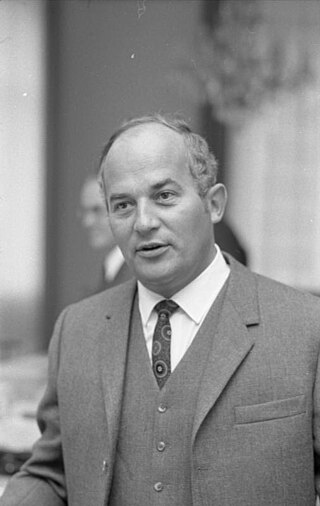
Rainer Candidus Barzel was a German politician of the Christian Democratic Union (CDU). He served as the eighth president of the Bundestag from 1983 to 1984.

Lesbian, gay, bisexual, and transgender (LGBT) rights in Germany rank among the highest in the world and have evolved significantly over the course of the last decades. During the 1920s and the early 1930s, lesbian and gay people in Berlin were generally tolerated by society and many bars and clubs specifically pertaining to gay men were opened. Although same-sex sexual activity between men was already made illegal under Paragraph 175 by the German Empire in 1871, Nazi Germany extended these laws during World War II, which resulted in the persecution and deaths of thousands of homosexual citizens. The Nazi extensions were repealed in 1960 and same-sex sexual activity between men was decriminalized in both East and West Germany in 1968 and 1969, respectively.
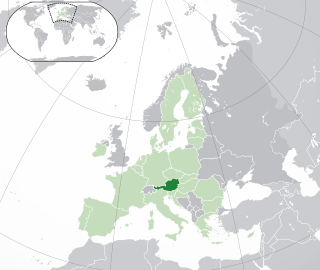
Lesbian, gay, bisexual, and transgender (LGBT) rights in Austria have advanced significantly in the 21st century, and are now among the most advanced in Europe. Both male and female forms of same-sex sexual activity are legal in Austria. Registered partnerships were introduced in 2010, giving same-sex couples some of the rights of marriage. Stepchild adoption was legalised in 2013, while full joint adoption was legalised by the Constitutional Court of Austria in 2016. On 5 December 2017, the Austrian Constitutional Court decided to legalise same-sex marriage, and the ruling went into effect on 1 January 2019.
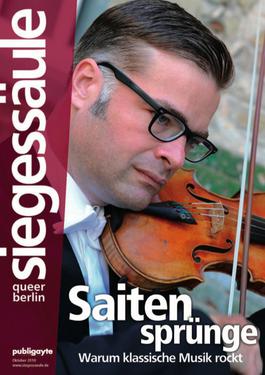
Siegessäule is Berlin's most widely distributed queer magazine and has been published monthly, except for two brief hiatuses, since April 1984. Originally only available in West Berlin, it ran with the subtitle "Berlin's monthly page for Gays". In 1996, it was broadened to include lesbian content, and in 2005 it was expanded to reach a wider queer target base, becoming the only magazine of its scale in Europe to represent the full spectrum of the LGBT community. The magazine is available for free at around 700 locations in Berlin, printing 53.688 copies per month. Since March-issue 2013, it has been overseen by chief editor Jan Noll.

The Berlin Pride Celebration, also known as Christopher Street Day Berlin, or CSD Berlin, is a pride parade and festival held in the second half of July each year in Berlin, Germany to celebrate the lesbian, gay, bisexual, transgender and queer (LGBTQ+) people and their allies. Since 1979, the event has been held each year. Berlin Pride is one of the largest gay and lesbian organized events in Germany and one of the biggest in Europe. Its aim is to demonstrate for equal rights and equal treatment for LGBT people, as well as celebrate the pride in Gay and Lesbian Culture.
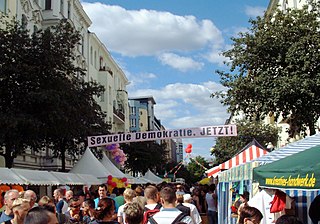
Berlin was the capital city of the German Empire from 1871 to 1945, its eastern part the de facto capital of East Germany from 1949 to 1990, and has been the capital of the unified Federal Republic of Germany since June, 1991. The city has an active LGBT community with a long history. Berlin has many LGBTIQ+ friendly districts, though the borough of Schöneberg is widely viewed both locally and by visitors as Berlin's gayborhood. Particularly the boroughs North-West near Nollendorfplatz identifies as Berlin's "Regenbogenkiez", with a certain concentration of gay bars near and along Motzstraße and Fuggerstraße. Many of the decisive events of what has become known as Germany's second LGBT movement take place in the West Berlin boroughs of Charlottenburg, Schöneberg, and Kreuzberg beginning in 1971 with the formation of the Homosexuelle Aktion Westberlin (HAW). Where as in East Berlin the district of Prenzlauer Berg became synonymous with the East Germany LGBT movement beginning in 1973 with the founding of the HIB. Schöneberg's gayborhood has a lot to offer for locals and tourists alike, and caters to, and is particularly popular with gay men. Berlin's large LGBT events such as the Lesbian and Gay City Festival, East Berlin Leather and Fetish Week, Folsom Europe, and CSD center around Schöneberg, with related events taking place city-wide during these events. Nevertheless, with roughly 180 years of LGBTIQ+ history, and a very large community made up of members with very varied biographies, it is hard to find a place in Berlin completely without LGBT culture past or present. Berlin's present-day neighborhoods with a certain concentration of LGBTIQ+ oriented culture vary somewhat in terms of history, demography, and where the emphasis in each neighborhoods' queer culture falls along the LGBTIQ+ spectrum. Over the course of its nearly two centuries of queer history (herstory), definitions not with standing, Berlin's LGBTIQ+ culture has never ceased to change, not only in appearance and self-understanding, but also in where the centers of queer culture were located in the city. What is true about Berlin's "LGBT culture in Berlin" at one point in time, in a given place and from a given perspective, is almost certainly different the next.
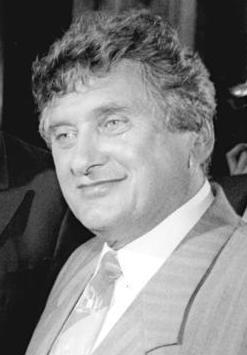
Tino Antoni Schwierzina was a German lawyer and politician. Between May 1990 and January 1991 he served as the first and last freely elected mayor of East Berlin. His term of office was dominated by the fusion of the two halves of Berlin which had been politically divided since before 1949. By some criteria Tino Schwierzina was also the last mayor of East Berlin ahead of reunification.

Transgender rights in the Federal Republic of Germany are regulated by the Transsexuellengesetz since 1980, and indirectly affected by other laws like the Abstammungsrecht. The law initially required transgender people to undergo sex-reassignment surgery in order to have key identity documents changed. This has since been declared unconstitutional. The German government has pledged to replace the Transsexuellengesetz with the Selbstbestimmungsgesetz, which would remove the financial and bureaucratic hurdles necessary for legal gender and name changes. Discrimination protections on the basis of gender identity and sexual orientation vary across Germany, but discrimination in employment and the provision of goods and services is in principle banned countrywide.

Kerstin Griese is a German politician of the Social Democratic Party (SPD) who has been serving as a member of the German Bundestag since 2000.
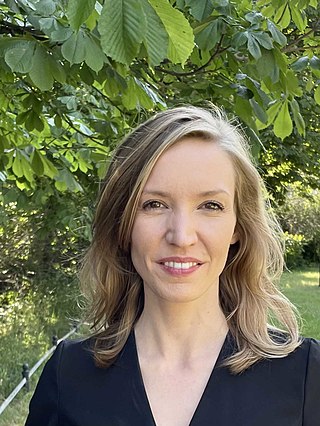
Ottilie Klein is a German politician of the Christian Democratic Union (CDU) who has been serving as a member of the Bundestag since 2021. In addition to her parliamentary work, she has been the secretary general of the CDU in Berlin since 2023, under the leadership of it chair Kai Wegner.
Vienna, the capital of Austria, has an active LGBTQIA+ community. Vienna is considered Austria's queer capital, with several LGBTQIA+ spaces, organisations and a history of LGBTQIA+ activism going back to the late 19th century.

The Wegner senate is the current state government of Berlin, sworn in on 27 April 2023 after Kai Wegner was elected as Governing Mayor of Berlin by the members of the Abgeordnetenhaus of Berlin. It is the 29th Senate of Berlin.
FLINTA* is a German abbreviation that stands for "Frauen, Lesben, Intergeschlechtliche, nichtbinäre, trans and agender", meaning women/females, lesbians, intersex, non-binary, trans and agender people. The asterisk represents all non-binary gender identities. To explicitly include queer individuals, the term FLINTAQ is sometimes used, expanding on the FLINTA acronym.
Sigrid Grajek is a German actor and cabaret actress.
Alfonso Pantisano is a German LGBT rights activist serving as the inaugural Queer Berlin Liaison Officer as part of the governing Berlin Senate in Berlin, Germany.
References
- 1 2 "Senat ernennt Alfonso Pantisano zur queerbeauftragten Person der Berliner Landesregierung". www.berlin.de (in German). 2023-07-11. Retrieved 2023-07-24.
- 1 2 ""Wir queeren Menschen leben regelmäßig in Angst. Auch in Berlin"". www.rbb24.de (in German). 2023-07-23. Retrieved 2023-07-24.
- ↑ "Alfonso Pantisano zum ersten Queer-Beauftragten des Landes ernannt". berlin.de (in German). Retrieved 2023-07-24.
- ↑ Conti, Lucia (2014-12-10). "Alfonso Pantisano, attivista LGBT italiano in Germania: "Non abbiate paura di mostrare come siete davvero"". il Mitte. Retrieved 2023-07-24.
- 1 2 Pantisano, Alfonso (22 July 2023). "Gestern hatte ich die Ehre auf der Bühne des Berliner #csd2023🏳️🌈 am Brandenburger Tor zu sprechen. Jetzt ruhe ich mich ein wenig aus und nächste Woche geht dann die inhaltliche Arbeit los. Es gibt viel zu tun!". Instagram.
- ↑ "Regenbogenfahne der Berliner Polizei: Queerbeauftragter zeigt Julian Reichelt an". Berliner Zeitung (in German). 2023-07-16. Retrieved 2023-07-24.